 Petzlover
Petzlover Cheetoh is originated from United States but Siberian is originated from Russia. Both Cheetoh and Siberian are of same weight. Both Cheetoh and Siberian has almost same life span. Both Cheetoh and Siberian has same litter size. Cheetoh requires Low Maintenance. But Siberian requires Moderate Maintenance
Cheetoh is originated from United States but Siberian is originated from Russia. Both Cheetoh and Siberian are of same weight. Both Cheetoh and Siberian has almost same life span. Both Cheetoh and Siberian has same litter size. Cheetoh requires Low Maintenance. But Siberian requires Moderate Maintenance
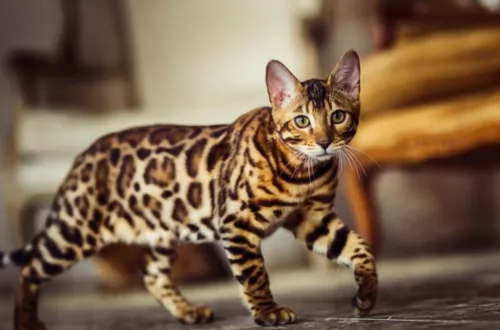 The Cheetoh is a beautiful cat whose parent breeds are the Ocicat and the Bengal.
The Cheetoh is a beautiful cat whose parent breeds are the Ocicat and the Bengal.
It was in 2001 that these two breeds were crossed by breeder Carol Drymon. Drymon was wanting to develop a new cat that would have characteristics similar to that of a wild cat but that would behave like a domesticated cat.
The Cheetoh became a recognized and registered breed with the United Feline Organization in November of 2004.
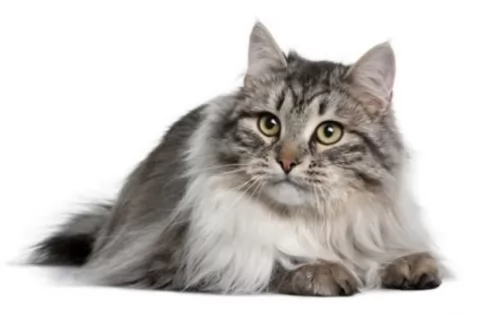 The beautiful Siberian cat originated from Russia, a very cold area which explains his thick coat.
The beautiful Siberian cat originated from Russia, a very cold area which explains his thick coat.
This is a natural variety of domestic cat. It is an ancient breed and it is believed that it is ancestral to all modern long-haired cats.
The Siberian is the national cat of Russia. The cat first arrived in the United States in 1990.
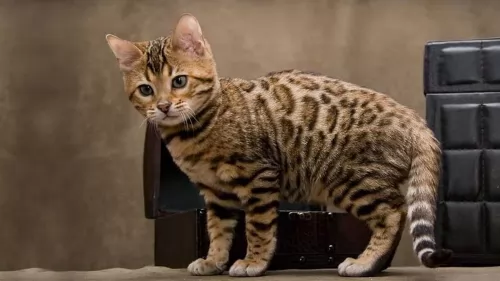 For a housecat, the Cheetoh is a muscular and large breed. In fact, this is one of the largest breeds of all the domesticated cats, with males being bigger than females. They can weigh anything between 7 and 10kg.
For a housecat, the Cheetoh is a muscular and large breed. In fact, this is one of the largest breeds of all the domesticated cats, with males being bigger than females. They can weigh anything between 7 and 10kg.
People want to own an animal that looks like a wild cat and the Cheetoh looks like a Cheetah. The coat of the cat can be several different colors and can be in different patterns with spots and stripes. He gets the spots from both the parent cats - the Ocicat and the Bengal. He definitely getd the longer legs from the Ocicat.
The purpose of the Cheetoh breeding program was to create an exotic, intelligent cat with a wild look and that would also be larger than your regular domestic cat. You could say it's the cats wonderfully soft, a velvety coat that makes it such an attractive cat.
Also, another notable feature with the cat is the way it walks - it looks as though it is stalking and prowling.
The cats are bred in 6 colors referred to as the black- or brown-spotted sienna, the black-spotted smoke the black- or brown-spotted gold, the black-spotted silver and the gold-spotted.
Your fascinating Cheetoh is a fun-loving cat, being playful and energetic and he will require a large yard and require being exercised.
They’re gentle cats but are talkative, being quietly friendly and social.
They make great family pets. They become devoted to their human family, being loyal and companionable. He is an affectionate, loving cat and his intelligence allows him to learn some simple commands and tricks.
He is the kind of cat that will do well in a family with kids and pets as he loves playfulness and fun, but he also wants to receive lots of love and attention.
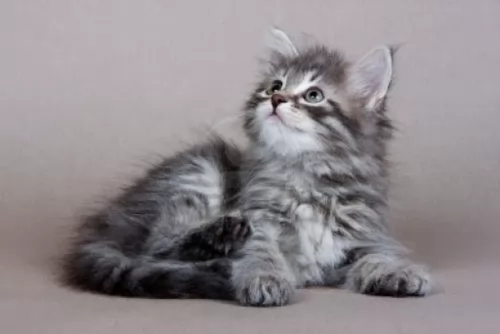 The Siberian is a medium to large-sized cat that weighs between 3 and 7kg. They are known to be excellent jumpers.
The Siberian is a medium to large-sized cat that weighs between 3 and 7kg. They are known to be excellent jumpers.
It is a powerfully built cat with large paws and a full tail. The ears are medium in size with large round eyes. The cat has a slight arch to its back as the hind legs are a bit longer than the front legs.
The glossy coat is in three layers to protect it from extreme weather conditions. It comes in different colors such as tortoiseshell, colorpoint, tabby, and solid. He sheds a couple of times a year.
The Siberian cat is highly affectionate with family and playful too. In spite of that, he also loves curling up close to where his humans are.
This friendly cat will want to follow you and be where you are. They’re intelligent and can be taught a few tricks. Because they’re athletic, it will be a good idea to buy him a climbing tree as he loves to leap up to a perch and watch things going on. He gets on well with children and other pets.
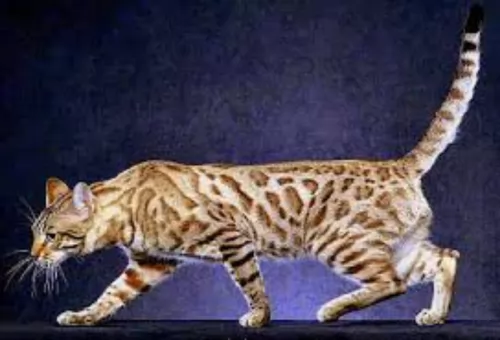 Cheetohs are a wonderful breed of cat and will love a busy household of adult humans, kids, and other pets.
Cheetohs are a wonderful breed of cat and will love a busy household of adult humans, kids, and other pets.
Remember that because of their wild side they have a high prey instinct and might like the idea of going after your small pets such as fish and birds.
Intelligent and playful you will need to keep your Cheetoh entertained and exercised with both mentally and physically stimulating puzzle-type games. One thing is for sure, with a Cheetoh in your home, you're never going to have a dull moment.
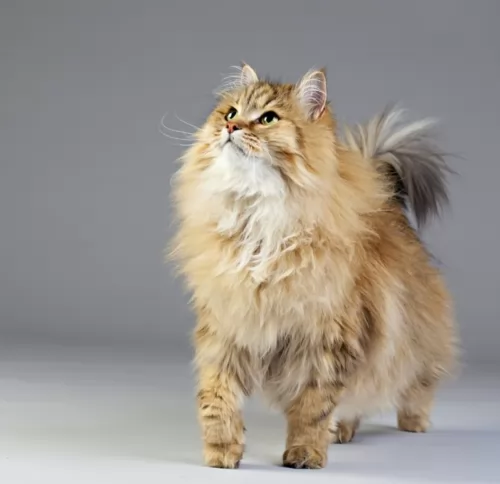 Your Siberian loves to climb and explore and to keep this gorgeous cat mentally stimulated and physically active, provide him with some fun toys that require him to think.
Your Siberian loves to climb and explore and to keep this gorgeous cat mentally stimulated and physically active, provide him with some fun toys that require him to think.
They are nice and strong these cats as well as being curious and alert and you see this in the bright, shiny eyes.
They’ve got easygoing personalities and are also considered fairly low maintenance cats, making them the perfect choice for any cat lover.
They are devoted and loyal to their human family and one of these cats in your home is guaranteed to bring in joy, entertainment, fun, and solid companionship.
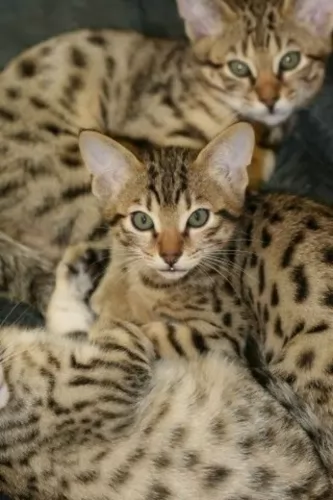 Whenever you buy a pet, particularly an exotic type of pet where you’ve spent a lot of money, make sure to check out potential health issues from the breeders.
Whenever you buy a pet, particularly an exotic type of pet where you’ve spent a lot of money, make sure to check out potential health issues from the breeders.
Always make sure to buy your cat from a reputable source to avoid health issues that could drastically shorten your Cheetoh cat’s life.
As with all cats, there are potential genetic problems in their ancestry that might reveal itself in your cat.
Certainly, if you suspect something is wrong, get your cat to the vet immediately.
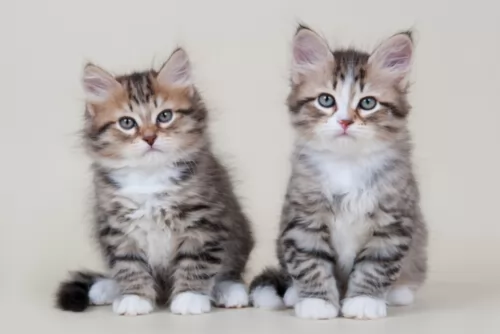 Siberian cats can succumb to stomach issues such as IBS. If you think your Siberian is in pain, he will need a visit to the vet. These cats are also susceptible to some hereditary health issues such as hypertrophic cardiomyopathy. If you buy a kitten, make sure you get your kitten from a reputable source.
Siberian cats can succumb to stomach issues such as IBS. If you think your Siberian is in pain, he will need a visit to the vet. These cats are also susceptible to some hereditary health issues such as hypertrophic cardiomyopathy. If you buy a kitten, make sure you get your kitten from a reputable source.
To ensure the best health for your Siberian, he will need high-quality cat food. High-quality food can actually prevent many health issues in the cat. A good idea will be to feed your Siberian vet-recommended food and in the right portions to keep him at the ideal weight.
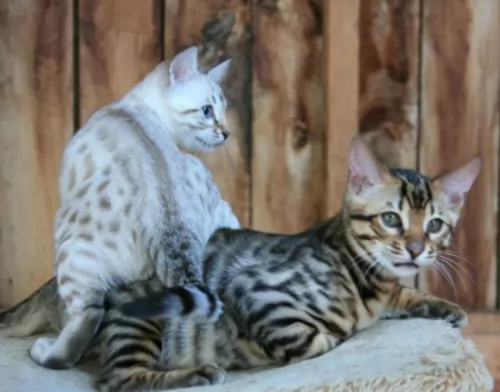 Although the Cheetoh is considered to be a hypoallergenic cat, no cat is really so, but nonetheless the coat is lovely and velvety and is shiny and short, being low shedding as well.
Although the Cheetoh is considered to be a hypoallergenic cat, no cat is really so, but nonetheless the coat is lovely and velvety and is shiny and short, being low shedding as well.
He will need lots of exercise, but luckily with his dog-like attributes, he can be taught to walk on a leash,
Ensure your cat has a nice dry, warm sleeping area.
These are energetic cats and he will need a complete commercially manufactured cat food that is high in protein, after all this is a carnivore and they require meaty diets.
If in any kind of doubt as to what to feed your Cheetoh, speak with your veterinarian if you have any concerns.
Make sure that your cat is never without a constant supply of fresh, cool water. A water fountain, with moving water, always encourages water drinking with cats.
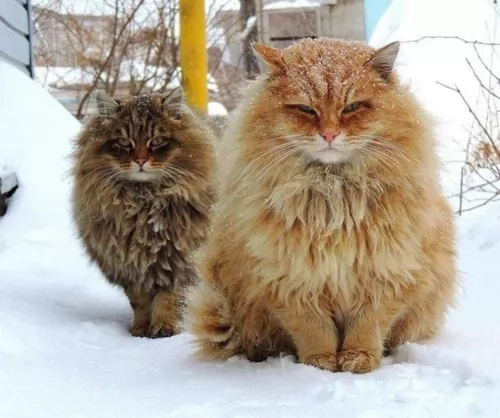 Prepare your home for the arrival of your Siberian cat. Cats are natural climbers and scratchers and he will need a scratching post, climbing tree, litter box, food and water bowls, bed as well as collar and tag. Also, invest in a large cat carrier, as your cat will need to be transported safely to the vet at certain times.
Prepare your home for the arrival of your Siberian cat. Cats are natural climbers and scratchers and he will need a scratching post, climbing tree, litter box, food and water bowls, bed as well as collar and tag. Also, invest in a large cat carrier, as your cat will need to be transported safely to the vet at certain times.
Provide toys for your Siberian cat. They’re intelligent and you don’t want to have him bored and listless. They need mental and physical stimulation so it will be fun to invest in some puzzle games for your pet.
Siberians have lovely thick coats and you want the right grooming accessories to brush him so that the coat doesn’t get dull and tangled. He will need to be brushed once or twice a week, especially when he sheds.
Keep your Siberian healthy by seeing he gets to the vet when he is sick. Also, if he is a kitten, he will need his vaccines. He will need to be checked over for parasites too – ticks, fleas, and worms, more so if he is an outdoor cat.
Trim your Siberian's nails as needed and also check the inside of his ears for signs of redness, dirt, and wax buildup as well as unpleasant odors. Many cat owners don’t like to probe around inside a cat’s ears as it can be damaging if you don’t know what you’re doing. Rather ask your vet to do it for you.
The vet can also check your cat’s teeth for signs of infection. Many people recommend cleaning the cat's teeth with a brush and cat toothpaste but this can be most traumatic for a cat and your pet groomer or vet can rather check his teeth for you.